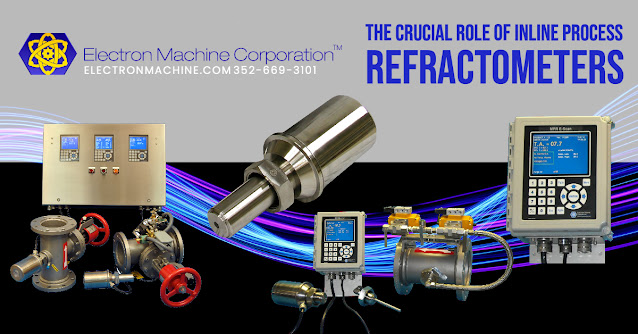Electron Machine Corporation (EMC), based in Umatilla, Florida, has pioneered industrial instrumentation since 1946. Founded by Carl A. Vossberg Jr., the company introduced the first inline process refractometer to meet the needs of the burgeoning citrus industry. Today, EMC's rugged refractometers are integral to the pulp and paper, food and beverage, and chemical processing industries.
Product Lineup
EMC offers a range of precision instruments designed for various industrial applications:
MPR E-Scan™ Inline Process Refractometer: A robust device providing continuous, real-time measurements of liquid concentrations, ensuring optimal process control.
MDS Pulp & Paper Inline Process Refractometer: This system, tailored for the pulp and paper sector, monitors black liquor solids, enhancing recovery boiler safety and efficiency.
DSA E-Scan™ Dissolved Solids Analyzer: A bench-top refractometer with a temperature-controlled sample chamber that delivers accurate readings for quality control in various industries.
Industry Trends
The process analyzer market is experiencing significant growth, projected to expand from $7.37 billion in 2024 to $7.79 billion in 2025, with a CAGR of 5.7%. This surge is driven by the increasing complexity of industrial processes and the need for real-time data to optimize operations. Advancements in automation and the integration of process analyzers into digital systems are enhancing operational efficiency and precision. Additionally, the rising demand for wastewater treatment and stringent environmental regulations are propelling the adoption of process analyzers across various industries.
In North America, process manufacturing is evolving rapidly, influenced by emerging technologies, regulatory changes, and global geopolitics. Companies are rethinking supply chain strategies, shifting towards more agile, regionally focused networks to mitigate unpredictability. Investments in strengthened supplier relationships and the integration of cutting-edge technologies are becoming essential to navigate the industry's challenges and opportunities.
Commitment to Innovation
EMC remains dedicated to innovation, continuously enhancing its product offerings to meet the evolving needs of modern industries. The company's global network of technical distributors ensures comprehensive support and service to its clients worldwide. As the industrial landscape advances, EMC's expertise and commitment position it as a trusted process optimization and control partner.
https://electronmachine.com
+1 352-669-3101




